Carrier oils have existed since the time of ancient Greece and Rome, when aromatic oils were used for massages, baths, cosmetics, and medicinal purposes.
Essential oils can be mixed to offer the precise therapeutic effects that each individual wants by diluting them in a plant-based carrier oil and applying them topically.
Natural, plant-based oils called carrier oils for organic skincare are found in products. They are necessary for multiple reasons in organic skincare products:
1. Dilution: Essential oils, which are strong and can irritate skin when applied undiluted, are diluted by adding the concentrated oils to reduce the irritancy potential using carrier oils. They thus are safe to apply topically.
2. Moisturization: Carrier oils are helpful to prevent dehydration of the skin causing dryness and help to maintain the skin soft and supple. This is possible due to the fact that carrier oils are rich in fatty acids and nutrients that help hydrate and nourish the skin.
3. Skin Barrier Protection: Carrier oils are responsible for the protection of the skins outer surface. They do this by forming a protective barrier on the skin. This barrier prevents moisture loss and protects against environmental damage, which is very important in today’s world for maintaining healthy and beautiful skin.
4. Nutrient Delivery: Carrier oils also deliver additional beneficial compounds like vitamins, antioxidants, and other nutrients into the skin, enhancing the overall effectiveness of the organic skincare products.
5. Texture and Absorption: Carrier oils not only influence the texture but also affect the absorption capacity of skincare products, making them more user-friendly and allowing them to be easily absorbed into the skin.
6. Stability: Carrier oils acts as a natural preservative and help in protecting the product against rancidity and oxidation there by extending the shelf life of organic skincare products.
7. Customization: By choosing carrier oils with certain qualities suitable for different skin types and objectives, including boosting hydration or calming sensitive skin, organic skincare products can be customized to order.
Therefore, it can be stated that carrier oils are crucial to organic skincare products since they provide a nourishing, safe, and adaptable base that improves the products’ efficacy and user experience.
Why Is the use of Carrier oils for Organic skincare gaining popularity?
First let us consider why the popularity of organic skincare has been steadily increasing in recent years, if we look for reasons we can list them as below:
- Health and Safety: People are become increasingly aware of the possible health hazards linked to harsh ingredients and synthetic chemicals that are frequently included in traditional skincare products. Many people believe that skincare products made of organic ingredients are safer than those made of other ingredients.
- Environmental Concerns: Because chemical-laden skincare products have the potential to damage ecosystems and increase pollution, many people are concerned about how these products may affect the environment. Organic skincare frequently highlights environmentally beneficial and sustainable methods.
- Natural and Holistic Approach: The increasing popularity of natural and holistic approaches to health and wellness is in line with organic skincare. The advantages of adopting organic, plant-based substances for skin care are becoming more widely recognized.
- Transparency: Organic skincare companies frequently place a high value on it by disclosing all of their ingredients. Customers are guaranteed to know what they are putting on their skin and are assisted in making educated decisions.
- Effectiveness: It has been discovered that a number of organic substances, including natural emollients, essential oils, and plant extracts, provide positive skincare results without the possible negative consequences of synthetic substitutes.
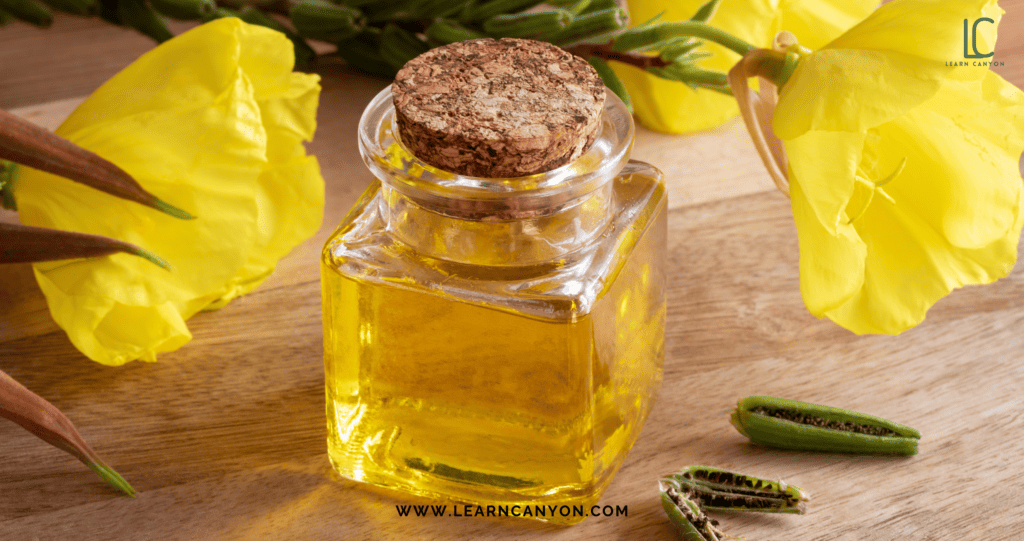
What Are Carrier Oils? And how are they different from Essential oil
Carrier oils and essential oils are both used in various skincare and aromatherapy applications, but they serve distinct purposes and have different characteristics:
We shall first understand the definitions of both and find out how different they are?
Carrier Oils: Carrier oils, also known as base oils or vegetable oils, are natural, fixed oils extracted from the fatty portions of plants, such as seeds, nuts, or kernels.
Essential Oils: Essential oils are highly concentrated extracts derived from various parts of aromatic plants, such as leaves, flowers, bark, or roots. They capture the plant’s fragrance and contain its volatile compounds.
Differentiating factors of carrier and essential oils
| Factor | Carrier Oil | Essential Oil |
| Purpose | It is used to dilute essential oils and make them safe for topical application. They serve as a neutral base to disperse the concentrated essential oils. | They are used for their therapeutic and aromatic properties. They can be applied topically after dilution with carrier oils. |
| Texture | They are typically thick and have a mild, neutral scent. They are non-volatile and do not evaporate quickly | They are potent and carry the distinct fragrance and therapeutic properties. They evaporate quickly and are highly volatile. |
| Benefits | Carrier oils are often chosen for their nourishing properties and are used to moisturize and hydrate the skin. Different carrier oils offer various benefits, such as jojoba oil for balancing skin, coconut oil for deep hydration, and rosehip oil for its anti-aging properties. | Essential oils are valued for their potential therapeutic benefits, including aromatherapy, relaxation, stress relief, and addressing specific health concerns. For example, lavender essential oil is known for its calming properties, while tea tree oil is used for its antimicrobial qualities. |
Essential oils are concentrated extracts valued for their smell and possible medicinal benefits; carrier oils are generally used as a basis to dilute and disseminate essential oils. To guarantee a safe and effective application, dilution is necessary when utilizing essential oils topically.
Role of carrier oils in skincare products
Carrier oils play a significant role in skincare products by providing a base for various cosmetic and therapeutic formulations. They offer several benefits for the skin, including moisturizing, nourishing, protecting, improve absorption, skin balancing, etc.
- Moisturizing: Fatty acids, which are abundant in carrier oils, act as emollients to hydrate and moisturize the skin. They build a barrier on the skin’s surface to stop moisture loss and support the skin’s natural moisture balance. This can be especially helpful for people whose skin is dry or dehydrated.
- Nourishing: Different carrier oils contain specific nutrients, vitamins, and antioxidants that can nourish and improve the health of the skin. For example, oils like jojoba, argon, and rosehip are known for their skin-nourishing properties, offering vitamins like vitamin E and essential fatty acids that support skin health.
- Protection: The skin can be shielded from environmental stresses by carrier oils. They serve as a shield, offering a layer of defense that might lessen the negative impacts of outside elements including pollution, UV rays, and inclement weather. By preventing premature aging and maintaining the integrity of the skin, this protection can help.
- Enhanced Absorption: Carrier oils improve the absorption of other active ingredients in skincare products. They help these ingredients penetrate the skin more effectively, ensuring that the skin can benefit from their therapeutic properties.
- Skin Balancing: Certain carrier oils have properties that can help balance the skin’s oil production. Some carrier oils, like jojoba oil, have a composition that is similar to the skin’s natural sebum. Using such oils can help balance oil production, making them suitable for oily or combination skin types.
- Aiding Ingredient Delivery: Carrier oils are used to dilute and disperse essential oils or other active ingredients in skincare products. This ensures that potent ingredients are applied evenly and safely to the skin.
- Soothing and Calming: Carrier oils with anti-inflammatory properties, such as almond oil or chamomile-infused oils, can soothe irritated or sensitive skin. They can help alleviate redness, itching, and discomfort.
Carrier oils serve as a foundational component in skincare products, contributing to their texture, effectiveness, and the overall benefits they offer to the skin. These oils provide moisture, nourishment, and protection, making them essential in promoting healthy and vibrant skin.
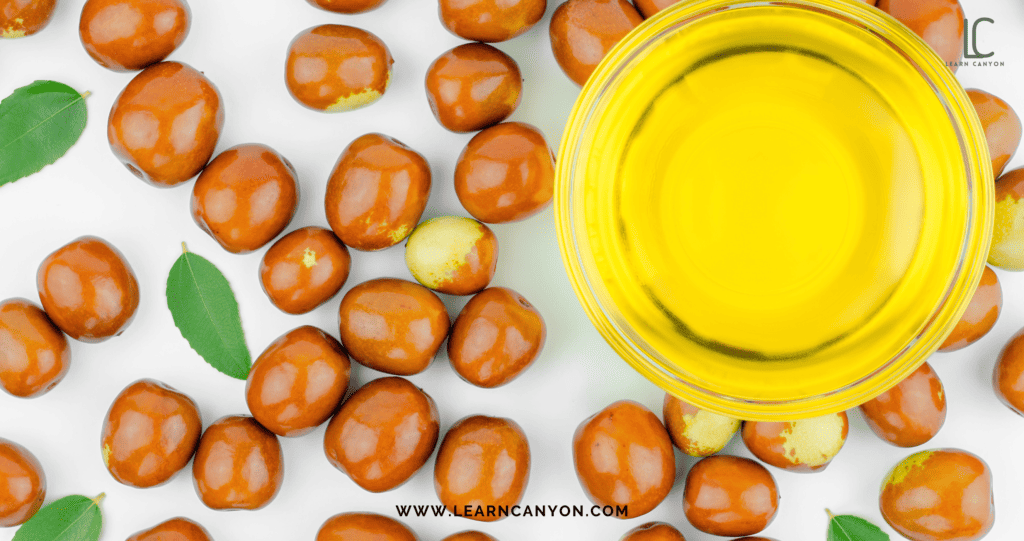
Common carrier oils used in organic skincare include:
- Jojoba Oil (Simmondsia chinensis): Jojoba oil closely resembles the skin’s natural sebum, making it suitable for various skin types. It’s light, non-greasy, and has a long shelf life.
- Coconut Oil (Cocos nucifera): Coconut oil is known for its deep moisturizing properties and is often used in skincare products for dry skin. It can also be used as a hair and scalp treatment.
- Argan Oil (Argania spinosa): Argan oil is rich in vitamin E and essential fatty acids, making it excellent for nourishing and hydrating the skin. It’s particularly beneficial for anti-aging skincare.
- Sweet Almond Oil (Prunus Amygdalus Dulcis): Sweet almond oil is mild and gentle on the skin, making it suitable for sensitive skin. It’s a good emollient and is often used in massage oils and creams.
- Grapeseed Oil (Vitus vinifera): Grapeseed oil is lightweight and easily absorbed, making it ideal for people with oily or acne-prone skin. It’s also rich in antioxidants.
- Olive Oil (Olea Europaea): Olive oil is a versatile carrier oil with moisturizing properties. Extra virgin olive oil, in particular, contains high levels of antioxidants.
- Rosehip Seed Oil (Rosa mosqueta): Rosehip oil is renowned for its skin-repairing and rejuvenating properties. It’s rich in vitamin C, which can help brighten the skin and reduce the appearance of scars and fine lines.
- Evening Primrose Oil (Oenothera biennis): Evening primrose oil is known for its anti-inflammatory properties and is used to soothe conditions like eczema and psoriasis. It’s also beneficial for mature skin.
These carrier oils can be used on their own or blended to create custom organic skincare formulations that cater to specific skin needs and preferences.
Using Carrier Oils in Skincare Formulations
Carrier oils are versatile and can be used in various ways in skincare formulations. Here are some common methods for incorporating carrier oils into your skincare products:
- Blending with Essential Oils:
- Carrier oils are often used to dilute essential oils for safe topical application. Essential oils are highly concentrated and can cause skin irritation if applied directly. To blend them:
- Choose a carrier oil suitable for your skin type and the desired benefits.
- For a 2-3% dilution (recommended for most adults), add 6-9 drops of essential oil to every 1 ounce (30 mL) of carrier oil.
- Mix the carrier oil and essential oil well before applying to your skin. This creates a custom essential oil blend that caters to your specific needs.
- Base for Serums:
- Carrier oils serve as an excellent base for serums, which are concentrated skincare products designed for specific purposes, like hydration, anti-aging, or brightening.
- To create a serum, select a carrier oil that aligns with your skin’s needs and add other active ingredients, like essential oils or antioxidants.
- Mix and store your serum in a dark glass dropper bottle for easy application.
- Moisturizers:
- Carrier oils can be used as the primary base for moisturizers. You can create simple, natural moisturizers by blending carrier oils with other beneficial ingredients:
- Select a carrier oil that suits your skin type.
- Add additional ingredients like Aloe Vera gel, Shea butter, or essential oils for extra nourishment.
- Mix thoroughly and apply as a daily moisturizer.
- Massage Oils:
- Carrier oils are commonly used as the base for massage oils, combining the benefits of the oil with the therapeutic properties of essential oils for relaxation and muscle relief.
- Choose a carrier oil that provides good glide, like sweet almond or fractionated coconut oil.
- Add a few drops of essential oils for fragrance and therapeutic effects.
- Cleansing Oils:
· When used in oil cleansing procedures, carrier oils help keep the skin’s moisture balance while removing debris and makeup.
· After massaging your skin with a carrier oil that is appropriate for your skin type, gently remove any remaining oil and pollutants with a warm washcloth.
When using carrier oils in your skincare formulations, it’s essential to consider your skin’s type and specific skincare goals. Additionally, be mindful of the potential shelf life and storage requirements of the carrier oil you choose to ensure your products remain effective and safe for use.
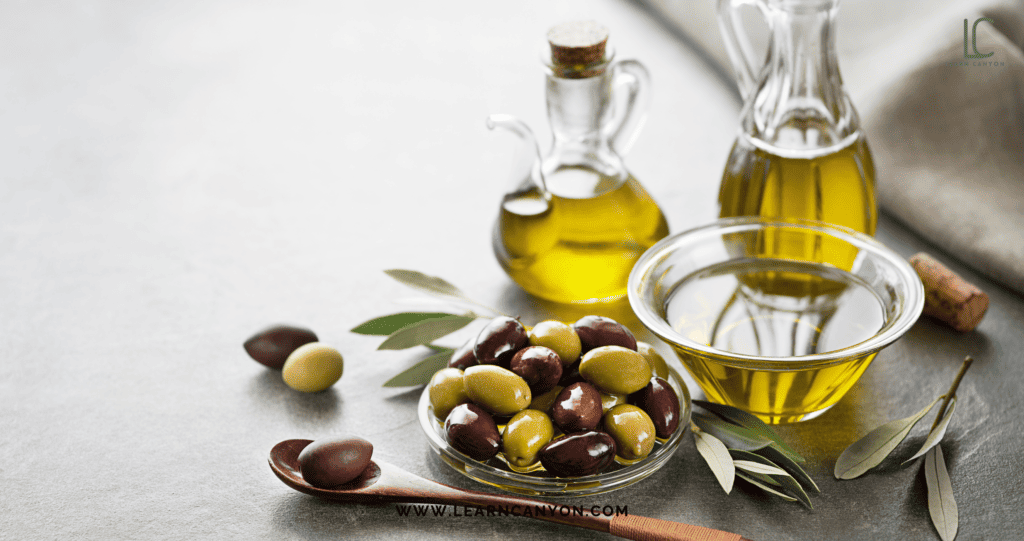
Tips on how to measure and mix carrier oils for best results
Accurately measuring and blending carrier oils is essential to getting the intended effects from your skincare formulas. The following advice will help you measure and mix carrier oils correctly:
Measuring Carrier Oils:
Use the Right Tools: For exact measurements, invest in measuring tools that are accurate, such as graduated cylinders, glass pipettes, or kitchen scales. You can measure your carrier oils consistently with the help of these equipment.
Understand Ratios: Know which ratios are suggested for the particular skincare product you use. For example, standard dilution ratios for essential oils are two to three percent essential oil to carrier oil.
Pay Close Attention to Formula: If you’re using a skincare formula or preparation, pay close attention to the directions about how much carrier oil to use. The effectiveness of the product may be impacted by deviating from the suggested measurements.
Mixing Carrier Oils:
Select a Clean Container: When combining carrier oils, use dry, clean dishes or containers. Any moisture or residue could contaminate your blend.
Mix Completely: Mix the extra components well with the carrier oils. To make sure the mixture is uniform, use a whisk or utensil. When working with other substances, such as essential oils or active chemicals, this is extremely crucial.
Use Non-Reactive Materials: Steer clear of containers made of plastic or other reactive materials because certain essential oils and carrier oils may react with plastics and cause degradation.
Stir Carefully: Use caution when stirring or combining ingredients to prevent the mixture from becoming very airy, since this may alter the finished product’s texture.
Store Blends in Dark Glass Bottles: When storing blends for later use, pour them into a dark glass bottle that has an airtight closure. This aids in shielding the carrier oils from air and light, which might oxidize them.
Label Well: Always mark your carrier oil blends with the type of oils used, the preparation date, and the intended usage on the label. This guarantees that you can recognize and follow your products with ease.
Store Properly in a cool, dark and dry place.
By measuring and mixing carrier oils carefully and following best practices, you can create effective and safe skincare products that cater to your specific needs and preferences.
Check out our LinkedIn post on Essential oils Vs Carrier oils
In conclusion
Worries about the environment, health, and a growing desire for natural, transparent solutions are the reasons behind the growing popularity of organic skincare using Carrier oils in products.
Making sure your skincare regimen is safe, efficient, and customised to your specific needs requires choosing the best products for your skin type.
I strongly encourage you to experiment with different carrier oils to discover the ones that work best for your unique skin type and concerns. Here are a few reasons why this experimentation can be incredibly beneficial for your skincare routine as you can personalise your product to get Targeted Benefits while taking care of Allergies and Sensitivities.
The texture and absorption parameters can be well handled while keeping the cost in check.




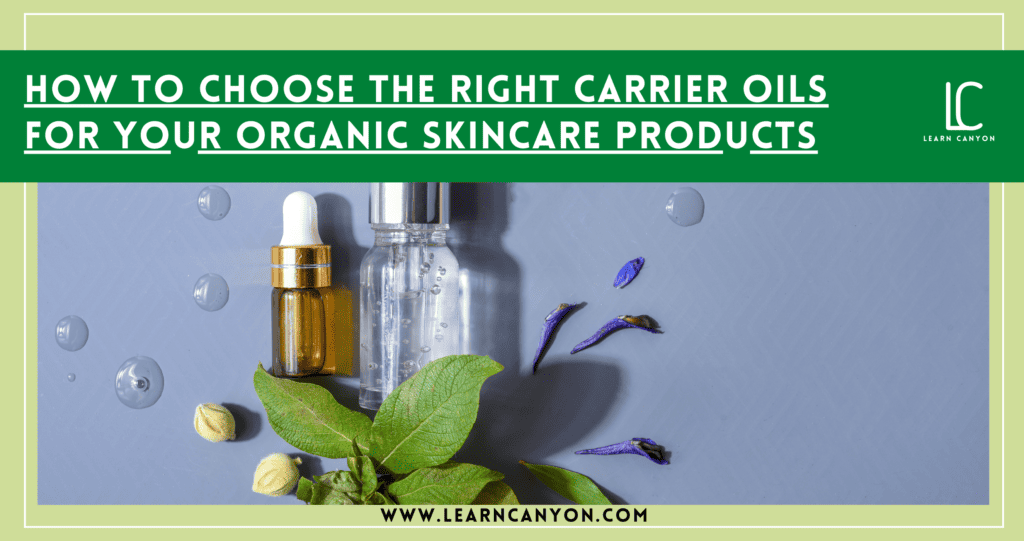

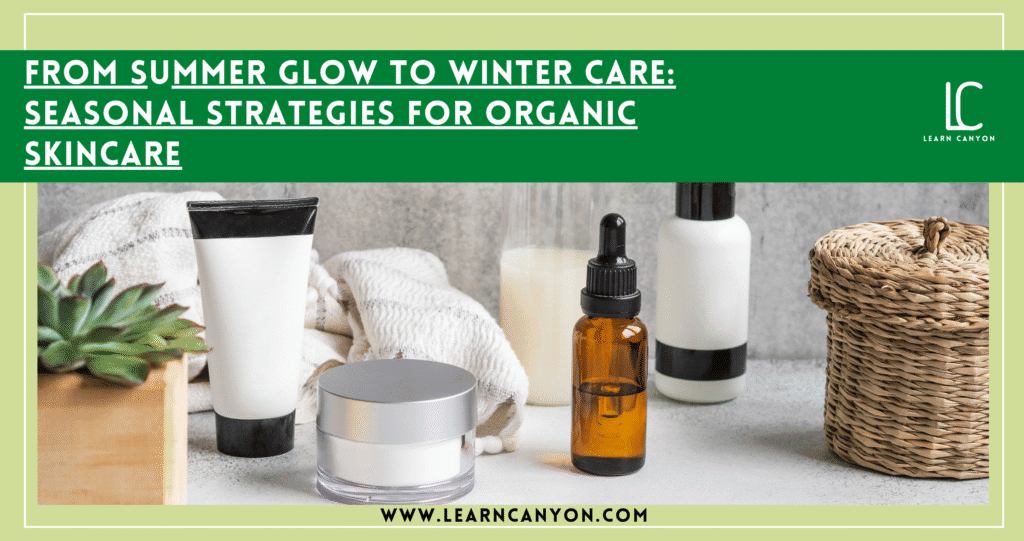
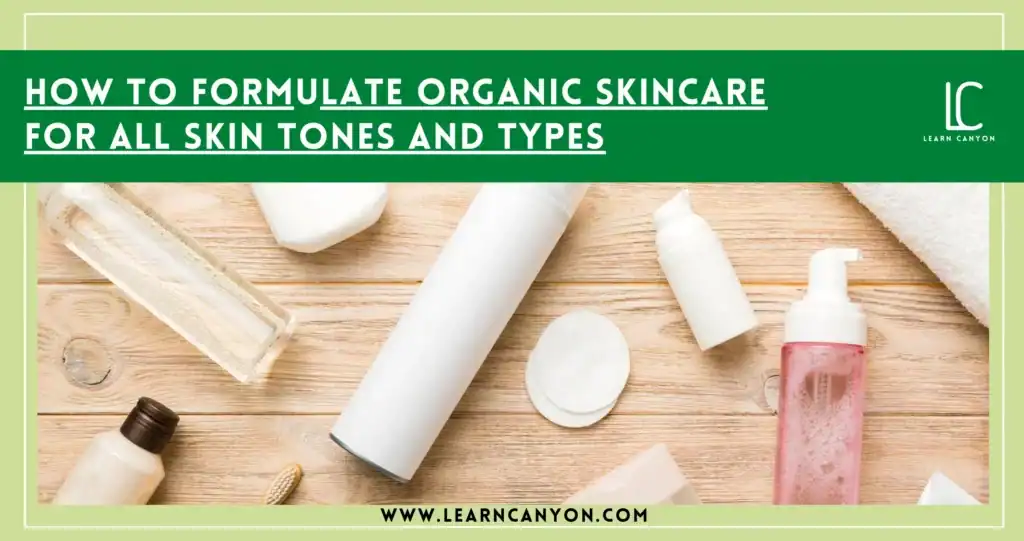





2 thoughts on “How to Choose Ideal Carrier Oils for Organic Skincare Products”
Thank you for this informative guide on the benefits of carrier oils in organic skincare! At EssentialNaturalOils.com, we’re passionate about providing high-quality carrier oils that contribute to the efficacy and safety of skincare products. Explore our range of carrier oils to elevate your skincare routine naturally. EssentialNaturalOils.com/pages/carrier-oils.
Carrier oils are essential for diluting potent essential oils and providing deep moisturization, making them a cornerstone of organic skincare.